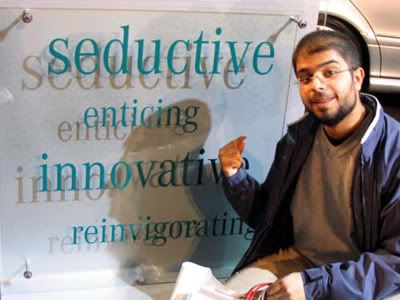We live in the future
Sometimes I decide that this world, right here, right now, is the future. Let me explain.
We live in a world where we can connect instantly with anyone, anywhere in the world. Letter, phone, video, even in person. Every day I carry in my pocket a device that lets me reach and be reached, anywhere at any time. It shows me entire movies and lets me record my own , plays me my music, keeps my schedule and to do list, stores all my contacts. Reminds me of birthdays. This tiny device can put the internet – the world – in the palm of my hand. I’m always connected, always on. It can even make phone calls.
Social networks – similar to blogs, but geared towards groups of friends and general frivolity, are an integral part of many young peoples’ lives. Kids keep in touch by face, by phone, and now online. What’s interesting is how you can follow links within and between groups of friends. You find out what they were up to on Friday night, that someone was out of town, that someone was ill. Follow the links and you get an insight in to peoples’ lives – never mind the fact that they live thousands of miles away and that you even don’t know them. Now you do.
The world has become a global, personal marketplace – albeit dominated by one corporation. Global trading is no longer reserved for international business – anyone, anywhere can set up and trade online within minutes - whether they’re genuine or not.
The world has indeed become a very, very small place. We live in the future.
Or do we? What about the poor, the patronisingly entitled ‘third world’? The very technologies that will help them most are priced far out of their reach. Technology might be advancing at a rapid rate, but the vast majority of our fellow humans are being left behind. In our haste to reach the future, we’re leaving them in the past.
We live in a world where we can connect instantly with anyone, anywhere in the world. Letter, phone, video, even in person. Every day I carry in my pocket a device that lets me reach and be reached, anywhere at any time. It shows me entire movies and lets me record my own , plays me my music, keeps my schedule and to do list, stores all my contacts. Reminds me of birthdays. This tiny device can put the internet – the world – in the palm of my hand. I’m always connected, always on. It can even make phone calls.
Social networks – similar to blogs, but geared towards groups of friends and general frivolity, are an integral part of many young peoples’ lives. Kids keep in touch by face, by phone, and now online. What’s interesting is how you can follow links within and between groups of friends. You find out what they were up to on Friday night, that someone was out of town, that someone was ill. Follow the links and you get an insight in to peoples’ lives – never mind the fact that they live thousands of miles away and that you even don’t know them. Now you do.
The world has become a global, personal marketplace – albeit dominated by one corporation. Global trading is no longer reserved for international business – anyone, anywhere can set up and trade online within minutes - whether they’re genuine or not.
The world has indeed become a very, very small place. We live in the future.
Or do we? What about the poor, the patronisingly entitled ‘third world’? The very technologies that will help them most are priced far out of their reach. Technology might be advancing at a rapid rate, but the vast majority of our fellow humans are being left behind. In our haste to reach the future, we’re leaving them in the past.




0 Comments:
Post a Comment
<< Home